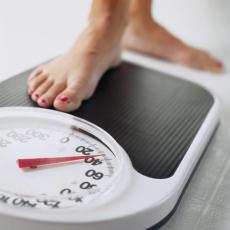|
Very low calorie diets - how safe are they, and do they really work long term?
Eating very low calorie diets - diets of less than 800kcal per day - will, undeniably produce weight loss, and rapidly at that. Every person whatever their weight or metabolism needs around 2000kcal simply to maintain healthy output, so taking in less than that will burn body tissue instead. Typical weight loss with very low calorie diets is around 2.5kg per week (or at least a stone per month). Most established VLCD products, marketed as total meal relacements, are very carefully formulated to ensure the delivery of the recommended daily allowance of every vitamin and mineral known to be required, as well as a minimum level of protein and essential fatty acids. Many of these products have been literally decades in development and distribution, with formulations tweaked according to latest findings and developments in nutritional science. Certainly attempting to live on less than this level of calories from self-selected food alone would potentially be very dangerous as it would be bound to omit some important nutrient.
It's like the formula vs breastmilk argument - study after shows that breastfed babies are healthier, and formula companies keep researching and developing new nutrients to add to their mixes and insist they are the best current science has to offer - but current science evolves constantly, and they will never, ever be a complete replacement for real food and everything it has to offer. 
Nutrition isnt the only aspect of very low calorie diets receiving constant research and development, the various manufacturers do their best to make the products as palatable and varied as possible. Every programme offers several varieties of milkshake, as well as some savoury soups and often food bars as well, which adds some textural variation, and sometimes drink flavourings - all intended to make it easier to comply with very low calorie diets for enough weeks to achieve sigificant weight loss goals... however it has to be said, IT IS TOUGH. Eating no more than 3 or 4 foodpacks a day, with very little variety for weeks on end, is very difficult to comply with in the real world. As with low carbohydrate eating the body enters a state of ketosis after a few days where body fat is burned as the primary fuel source, but transitioning to this is often particularly hard, with 'carbohydrate withdrawal' symptoms including headaches, nausea and irritability, not to mention hunger and food cravings. Other long term, less commonly reported symptoms of very low calorie diets include hair loss, menstrual irregularities, extreme tiredness, dry skin, dry mouth and cold intolerance, as well as a greater incidence of gallstones and kidney stones, both of which are excruiciatingly painful. Lots of people insist that food cravings vanish once ketosis is achieved... my experience is that they never do completely, although when and what you crave is very tied up with social and personal expectations and experience. Cultures round the world associate the sharing of food and drink with pleasure, relationships, and being social and hospitable - therefore adhering to very low calorie diets can make you feel isolated and antisocial. In time many people learn to sip a mineral water in the pub, and nibble a foodbar in a restaurant whilst friends tuck in to a delicious meal, but at first it's easier to hide away and not go out - making you feel more miserable and resentful. Add to this the highly sociable symptoms of bad breath and constipation, and you really feel like a dream companion..! A further common symptom is postural hypotension - otherwise known as feeling dizzy and weak especially when you move suddenly or get to your feet -which is scary and horrible, though unlikely to be dangerous... UNLESS of course you got dizzy spells when driving, for example. It does make it very hard to exercise whilst on a very low calorie diet, and this means that a significant proportion of your weight loss is likely to be muscle mass. Lots of studies show that the minimal amounts of protein and nutrients supplied in the complete programme do protect vital organs from wasting - the big danger with prolonged fasting/starvation - but at the end of it you will need to do a lot of toning up to look good on your weight loss. Many people losing significant amounts are also left with lots of very unattractive loose skin, which in extreme cases may need surgically sorting. Of course loose skin is to be expected after any weight loss, but generally the rate and overall amount of loss mean it's not too horrible, and generally skin and the muscle layers underneath do adjust to changed body shape ok.
I recall lots of advice in forums, about everything from nausea to constipation, being answered with 'drink more water' - which taken to extremes can be dangerous advice. Most of us DO need to drink more water than we currently do, but very serious medical consequences have resulted from people misguidedly drinking 2-3 litres in one go, in an effort to comply with their VLCD. Another main criticism of all meal replacement style diet programmes is that they aren't sustainable, that they don't reeducate users about how to manage their weight effectively in the future. Whilst some, such as Lighter Life, make a feature out of the 'removal' of the addictive substance known as real food during the weight loss process, the fact is that to sustain good weight control it's essential to develop a healthy relationship with every day food choices again at some point. Many of the programmes do include transitioning and maintenance levels to help achieve longer term change, but it is known that compliance with these programmes is less successful. The sheer 'easyness', the lack of decisionmaking involved about what to eat, is what attracts many users to these programmes in the first place. No planning, shopping, cooking, weighing, measuring - just eat the packs, 3 or 4 times a day as prescribed, over and over - its a total no-brainer. The rapid weight loss is it's own reward - weekly weigh-ins are incredibly motivating, and if you'd followed the programme faithfully all week since the last one, you WILL have lost weight. Unfortunately this very lack of thought and involvement is a major drawback when it comes to coming off the programme, and back into real life. Sadly, lots of people really do put all the weight back on again, if not straight away, then over the next few years. And perhaps more. Others 'yo-yo vlcd' - and every few years have to go through the programme again to get back to their target weight - which does not get any easier. Cambridge's counselor distribution network is one positive response to this, with many successful dieters going on to promote and retail the products locally, and having a great incentive to maintain their weight loss as their own best advert - an overweight Cambridge rep is not going to have many confident clients! But long term studies, over 5 years, indicate that the majority of people losing significant amounts of weight on very low calorie diets weigh MORE after 5 years than they did before they shifted a dramatic amount of weight on their chosen programme. 
Most of the lowest very low calorie diets are supposed to ONLY be available under supported programmes - Cambridge and Lighter Life both require medical sign-off and regular supervision through trained representatives, and others such as Lipotrim are only available through GP or pharmacy networks. All of these check for medical contraindications, such as kidney problems, or matters such as pregnancy, and they also check that potential participants are genuinely in need of the programme - normally the criteria for very low calorie diets' total meal replacement is to be clinically obese, with a body mass index of over 30 (other modified programmes including some additional daily meals are available for those with less weight to lose). However one very worrying trend, decried by all the reputable suppliers, is the increasing availability of branded food packs available without any supervision or restriction, eg through eBay - often auctions are described as 'having successfully achieved my weight loss I am selling off the last couple packs' - but the same people list similar lots week after week, and are clearly current suppliers/counsellors, regularly knocking off packs to completely unsupported and unknown customers on a regular basis. If the manufacturers deplored this as much as they say I am sure it would be easy to identify the sellers, through a bit of mystery shopping or simply tracking anomolous amounts of product shifted by counsellors with low numbers of clients currently on their books. As the packs often seem to retail for far larger sums than those supplied through the controlled channels, one can only wonder why people are prepared to pay so much for their very low calorie diets in this way... one worrying answer is that they are not medically eligible to receive them, and may even have eating disorders or be under-age... there is simply no way of knowing. The whole question of eating disorders and obesity is an extremely complex and individual one. Certainly there is a respectable school of thought that you cannot begin to address a psychological problem - the eating behaviour that got you clinically obese in the first place - by alleviating a physical symptom - that is, your excess weight. The 5 year studies certainly bear this out. So - very low calorie diets - good or bad thing? There is no easy answer to that one. If you are clinically obese and it is affecting your health, then a safely-followed very low calorie diet, including careful progression through the transitionary stages, followed by new healthy eating habits, must surely be a good thing. Certainly it's got to be preferable to dangerous appetite suppression drugs, or drastic surgical intervention. But you owe it to yourself to accurately follow a reputable programme, with a qualified supervisor, who can help you achieve your vegetarian weight loss goals safely and successfully. What you do with your diet and weight after that is no one's responsibility but your own.
|





 All total meal replacement VLCD programmes advise drinking lots of water, as a way to suppress food cravings, and also to ensure sufficient hydration especially when the meals themselves are supplied in powder form. Sometimes the recommended amounts of fluid seem extremely high, and there are a low number of cases of medical emergencies caused by people guzzling far too much water too fast or when unaccustomed to it, placing intolerable loads on vital organs.
All total meal replacement VLCD programmes advise drinking lots of water, as a way to suppress food cravings, and also to ensure sufficient hydration especially when the meals themselves are supplied in powder form. Sometimes the recommended amounts of fluid seem extremely high, and there are a low number of cases of medical emergencies caused by people guzzling far too much water too fast or when unaccustomed to it, placing intolerable loads on vital organs. 